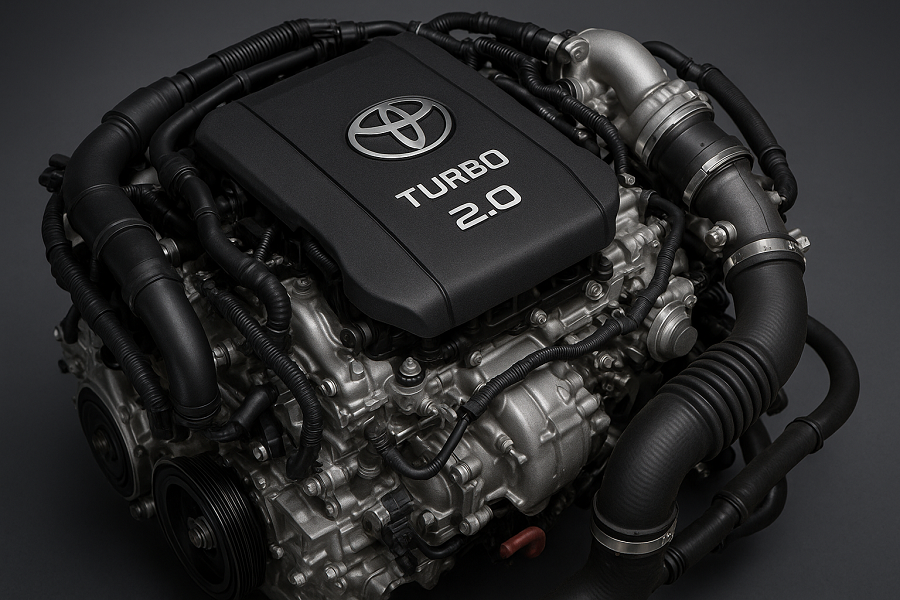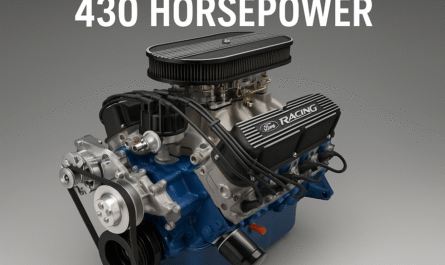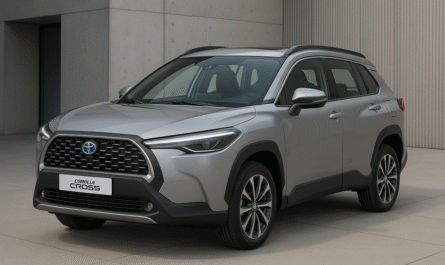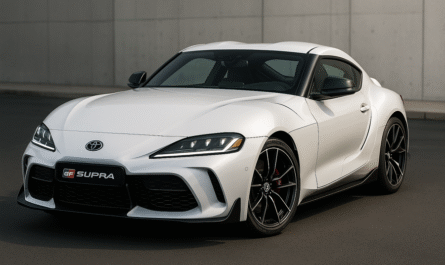Table of Contents
Table of Contents
Hey there, car lovers! If you’re curious about what makes modern cars zip down the road with power and efficiency, you’ve got to check out the Toyota 2.0L turbo engine. This engine is like the heart of some of Toyota’s coolest cars, combining speed, strength, and fuel savings in one sleek package. Whether you’re dreaming of driving a sporty Toyota Supra or a practical Toyota Corolla, this engine has something exciting to offer. In this article, we’ll break down what the Toyota 2.0L turbo engine is, how it works, its amazing features, and why it’s a game-changer compared to older engines. Let’s dive in!
What Is the Toyota 2.0L Turbo Engine?
The Toyota 2.0L turbo engine is a four-cylinder gasoline engine with a turbocharger—a device that increases power without needing a larger engine. The “2.0L” means it has a 2-liter displacement, which is the total volume of air and fuel the engine’s cylinders can hold. This engine, often known by its code name 8AR-FTS, is prepared to deliver a balance of performance and fuel efficiency, making it ideal for both everyday drivers and sporty cars.
Think of it like adding a supercharger to your bike—it gives you that extra push to go faster without pedaling harder. Toyota has sealed this engine with cutting-edge tech to make it powerful, reliable, and eco-friendly, which is why it’s used in some of their most popular models.
How Does a Turbocharged Engine Work?
Before we get into the nitty-gritty, let’s talk about what makes a turbocharged engine amazing. Unlike a naturally aspirated engine (which we’ll compare later), a turbocharged engine uses a turbocharger to force additional air into the engine’s cylinders. More air means more fuel can be burned, creating greater explosions that produce more power.
Here’s a simple breakdown of how it works:
- Exhaust Power: The engine’s exhaust gases spin a turbine in the turbocharger.
- Air Boost: The spinning turbine pulls in fresh air and compresses it before sending it to the cylinders.
- More Power: With more air and fuel in the cylinders, the engine generates more horsepower and torque (the twisting force that helps you accelerate).
This process makes the Toyota 2.0L turbo engine punch above its weight, delivering the power of a larger engine while keeping the size and fuel use of a smaller one.
Key Features of the Toyota 2.0L Turbo Engine
Toyota didn’t just hit a turbo on an old engine and call it a day. The 2.0L turbo engine is packed with smart technology to make it strong, efficient, and long-lasting. Here are some of its standout features:
1. D-4ST Fuel Injection System
Toyota’s D-4ST (Direct-injection 4-stroke gasoline engine with Superior Turbo) system is like a master chef combining the perfect recipe. It mixes direct fuel injection (spraying fuel straight into the cylinders) with port injection (spraying fuel into the intake ports). This duo optimizes fuel delivery based on how tough you’re pushing the engine, enhancing power and fuel efficiency while cutting emissions.
2. Single-Scroll Turbocharger
The single-scroll turbocharger is designed to decrease “turbo lag”—that annoying delay before the turbo kicks in. It delivers quick bursts of power, mainly at low speeds, so you get smooth acceleration whether you’re merging onto the highway or zipping through city streets.
3. Variable Valve Timing (VVT-iW)
The Variable Valve Timing – intelligent Wide (VVT-iW) system adjusts the timing of the engine’s valves to match your driving style. At low speeds, it prioritizes fuel efficiency; at high speeds, it increases performance. It’s like the engine is thinking for itself to give you the best of both world.
4. High Thermal Efficiency
With a compression ratio of 10.0:1, this engine squeezes more energy out of every drop of fuel. This high thermal efficiency means better fuel economy and lower CO₂ emissions, making it a win for both your wallet and the environment.
5. Durable Design
Toyota built the 8AR-FTS with high-quality materials and an efficient cooling system to ensure it lasts for years. With proper maintenance, this engine is prepared to keep running smoothly, even under hard conditions.
Performance Benefits: Why It’s a Powerhouse
The Toyota 2.0L turbo engine is all about giving big power in a little package. Here’s why it’s a favorite for car enthusiasts:
- Impressive Horsepower and Torque: This engine produces around 235–300 horsepower and up to 258 lb-ft of torque, depending on the model. That’s enough to make a compact car like the Toyota Corolla feel sporty or give the Toyota Supra some serious muscle.
- Quick Response: Thanks to the single-scroll turbo, you get instant throttle response, with torque kicking in as low as 1,650 rpm. This means fast acceleration without waiting for the engine to “wake up.”
- V6 Power, Four-Cylinder Efficiency: The 2.0L turbo delivers power similar to a larger V6 engine but uses less fuel, making it ideal for performance cars and daily commuters alike.
Compared to older naturally aspirated engines, the turbocharged design offers better highway passing power and quicker acceleration, making it feel more responsive and fun to drive.
Fuel Efficiency: Saving Gas Without Sacrificing Fun
One of the greatest perks of the Toyota 2.0L turbo engine is its fuel efficiency. Depending on the car and driving conditions, it achieves 25–30 miles per gallon (mpg), which is amazing for a turbocharged engine. Here’s why it’s so efficient:
- Smart Fuel Injection: The D-4ST system ensures the engine uses just the right amount of fuel, reducing waste.
- Turbo Efficiency: The turbocharger allows the engine to produce more power without needing a larger displacement, which saves fuel compared to bigger engines.
- Advanced Engineering: Features like VVT-iW and high thermal efficiency mean the engine burns fuel more effectively, so you spend less time at the gas pump.
For high school students who might be paying for their own gas (or borrowing Mom’s car), this engine strikes a great balance between performance and affordability.
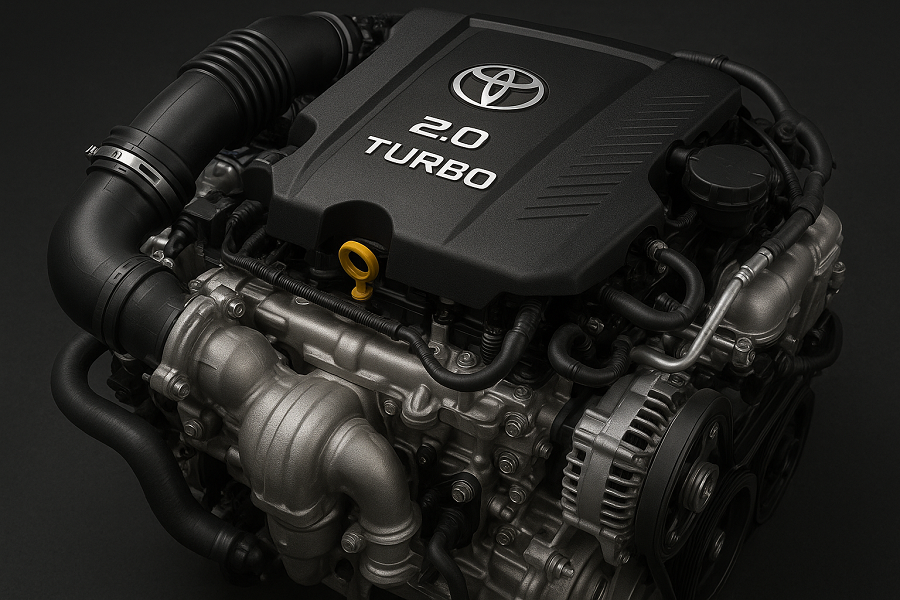
Toyota 2.0L Turbo vs. Naturally Aspirated Engines
To understand why the Toyota 2.0L turbo engine is so particular, let’s compare it to naturally aspirated engines, like the ones located in older Toyota models or some current Corollas (e.g., the 1.8L 2ZR-FE).
- Power Output: A naturally aspirated 2.0L engine, like the M20A-FKS in some Corollas, delivers around 169 horsepower. The turbocharged version, however, can push out 235–300 horsepower, making it way more exciting to drive.
- Torque: Turbo engines deliver torque at lower RPMs, so you feel the power sooner. Naturally aspirated engines often need to rev higher to hit peak torque, which can feel less responsive.
- Fuel Efficiency: While naturally aspirated engines can be efficient, the 2.0L turbo’s advanced tech (like D-4ST and VVT-iW) often matches or beats their fuel economy while offering more power.
- Size and Weight: Turbo engines are smaller and lighter than larger naturally aspirated engines (like a V6), which improves handling and efficiency.
The downside? Turbo engines have more moving parts, so they might need more maintenance over time. But Toyota’s reputation for reliability means the 2.0L turbo is built to last with proper care.
Vehicles Powered by the Toyota 2.0L Turbo Engine
The Toyota 2.0L turbo engine powers a variety of vehicles, from sporty rides to practical commuters. Here are some popular models you might see on the road:
- Toyota Supra: The Supra is a legend among car fans, and the 2.0L turbo (in the base model) gives it plenty of pep for a thrilling drive. It’s perfect for those who want a sports car without breaking the bank.
- Toyota Corolla: The GR Corolla, a high-performance version of the compact hatchback, uses a 1.6L turbo, but some Corolla models in other markets have used 2.0L turbo engines, offering sporty vibes in a practical package.
- Lexus Models: The Lexus NX, IS, GS, and RC use the 2.0L turbo for a blend of luxury and performance. These cars are great for those who want a premium feel with a sporty edge.
- Toyota Crown: This sleek sedan uses the 2.0L turbo in some markets, combining comfort with zippy performance.
Each of these vehicles shows how versatile the 2.0L turbo engine is, whether you’re after speed, style, or everyday reliability.
Why Students Should Care
If you’re a student who loves autos or just wants a reliable ride for getting to school and riding out with mates, the Toyota 2.0L turbo engine is worth knowing about. It offers the excitement of a strong car without guzzling gas, which is awesome if you’re saving up for other things (like new sneakers or concert tickets). Plus, Toyota’s reputation for making durable engines means you’re less likely to deal with breakdowns or expensive repairs.
This engine is also a great example of how carmakers are using technology to make vehicles more eco-friendly without sacrificing fun. For students interested in engineering or environmental science, the 2.0L turbo shows how innovation can balance performance and sustainability.
FAQs About the Toyota 2.0L Turbo Engine
Q: What does “turbo” mean in a car engine?
A: A turbo, or turbocharger, is a device that forces extra air into the engine to create more power. It helps smaller engines, like the 2.0L, perform like bigger ones while using less fuel.
Q: Is the Toyota 2.0L turbo engine reliable?
A: Yes! Toyota designed the 8AR-FTS with high-quality materials and an efficient cooling system. With regular maintenance, it’s built to last for many years.
Q: How fuel-efficient is the 2.0L turbo engine?
A: It gets about 25–30 mpg, depending on the vehicle and driving conditions. That’s great for a turbo engine, making it both powerful and wallet-friendly.
Q: What’s the difference between a turbo and a naturally aspirated engine?
A: A turbo engine uses a turbocharger to boost power, while a naturally aspirated engine relies on air drawn in naturally. Turbo engines typically offer more power and better low-end torque but may require more maintenance.
Q: Can the 2.0L turbo engine be used in racing?
A: Absolutely! Toyota is developing high-performance versions of this engine, with some reports suggesting up to 400–600 horsepower for racing models like a potential MR2 or Celica.
